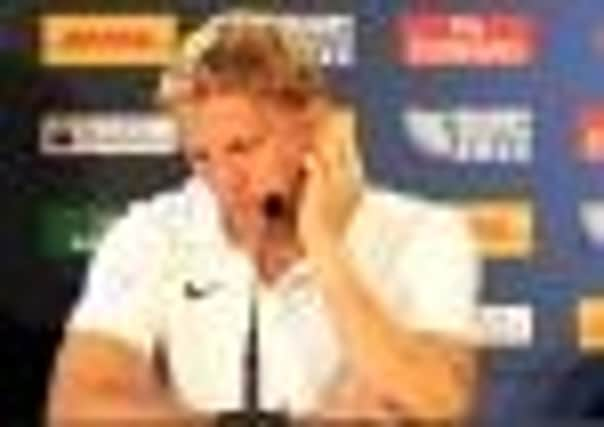Moody denies claims money meant more than success


Eight years after England lifted the World Cup, extracts from a damning dossier were published in The Times exposing the rifts and failings that contributed to a “doomed” bid for glory in New Zealand this year.
The three confidential reports into England’s World Cup performance were compiled by the Rugby Football Union, the Rugby Players’ Association and the Aviva Premiership clubs.
Advertisement
Hide AdAdvertisement
Hide AdFew parties connected with England come out of the findings well. The reports paint a grim picture of a disunited squad, riven by a lack of trust under the leadership of a management team out of their depth.
Last week Martin Johnson refused to explain why he was standing down as England manager. These reports may well have answered that question.
One of the key themes to emerge from the review process was a reported “culture of expectation”, that some players were motivated more by money than by success.
Moody has been implicated in that, with England’s elite rugby director Rob Andrew criticising him for leading a senior player delegation that disputed the squad’s World Cup payments.
Andrew’s RFU report was reported as saying: “Some of the senior players were more focused on money rather than getting the rugby right.”
Andrew’s charge is supported by evidence reportedly contained within the RPA’s review, which contained anonymous feedback from 90 per cent of the England squad.
One player told the story of a team-mate reacting to England’s quarter-final defeat by saying: “There’s £35,000 just gone down the toilet.”
Moody was also criticised by an unnamed team-mate for having too much contact with his agent, Mark Spoors, during the World Cup and setting the wrong example. The Bath flanker’s autobiography was published in the weeks following the tournament.
Advertisement
Hide AdAdvertisement
Hide AdBut Moody said: “I put my body on the line for the lads, the team and England every time I played and anyone who has watched me play knows that I give everything on the field and have always prioritised rugby ahead of everything else, including financial reward.
“I have only ever undertaken personal commercial activities in my own time and I’m comfortable I got that balance right at all times.
“Where I had to be involved in commercial conversations with the RFU it was as captain, working with the RPA, representing the best interests of the players, not for any personal gain. I do not think anyone who knows me would think differently.
“Captaining England was, and remains, the ultimate honour for me and I accepted that honour knowing all the scrutiny that came with it,” said Moody. “I am confident I did the job to the absolute best of my ability but if some of the players thought that was not enough I will have to learn to live with that.
“I have always been my own fiercest critic and have already been honest that there were some things I wish I had done differently at the World Cup, but I have learnt from the experience and hope others can do the same.”
Johnson is reportedly criticised for inconsistent team selections and for failing to instil discipline in the squad.
England took no immediate action against Mike Tindall after the now infamous night out in Queenstown, although Johnson latterly indicated his absence from the quarter-final defeat to France was disciplinary-related.
Tindall was subsequently fined £25,000 and dropped from the squad following an internal RFU investigation. The Gloucester centre is appealing against the fine today.
Advertisement
Hide AdAdvertisement
Hide AdBut it was Johnson’s coaching team – bar scrum specialist Graham Rowntree – who reportedly face some of the fiercest feedback from the players.
“It wasn’t Johnno, it was that Johnno was surrounded by the wrong people,” one un-named player reportedly said.
Andrew is quoted as saying that trust had broken down “between some of the coaches and players and between some of the senior players group and some of the younger members”.
England were eventually beaten by France in the quarter-finals, equalling their worst performance in a World Cup after a campaign dogged by controversy.
On top of the Tindall affair, Manu Tuilagi was fined for jumping from a ferry into Auckland harbour in the wake of England’s quarter-final defeat.
James Haskell and Chris Ashton each received suspended fines on their return following an incident in the team’s hotel.
Three England players, including Moody, were fined for wearing branded mouthguards that broke World Cup regulations and two coaches, Dave Alred and Paul Stridgeon, were suspended for illegally switching balls during the game against Romania.
The RPA’s report concludes with five key recommendations for stricter discipline.
Advertisement
Hide AdAdvertisement
Hide AdIt says: “Players must be accountable for their actions – no exceptions.
“A much stricter regime needs to be enforced from the top down. Senior players should be treated the same as younger players. Exceptions should not be made.
“A stronger message [should be sent] that, if you cross the line, you will be punished.”